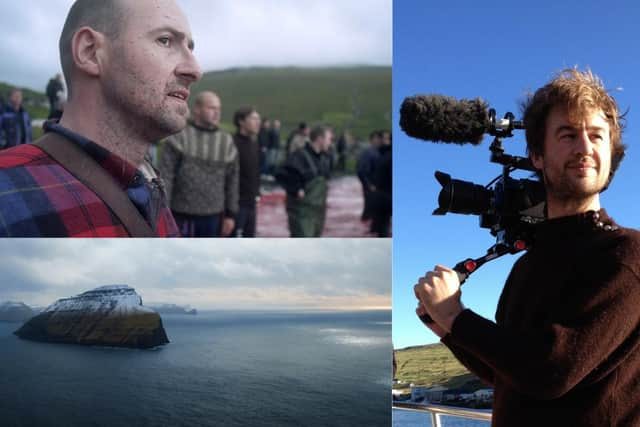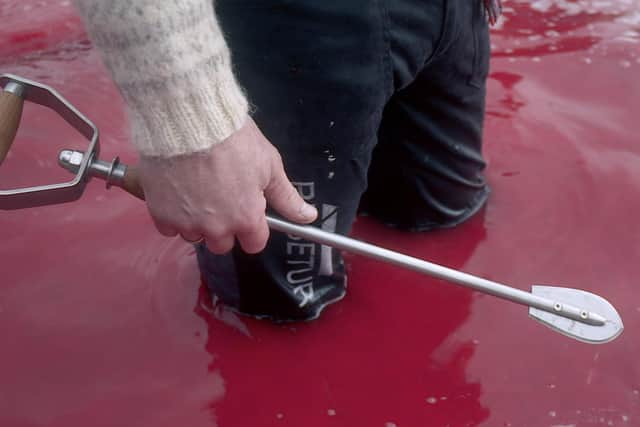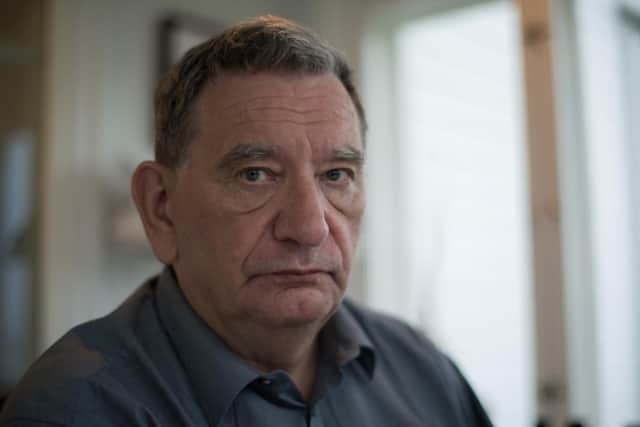Faroe whaling: Lothian filmmaker's documentary featuring contentious whale hunt now showing on BBC Scotland
Those were the words of Mike Day, a filmmaker from North Berwick, who spent five years working on a film about the devastating impact human activity has had on the Faroe Islands.
Available for the next week on BBC Scotland, his documentary The Islands and the Whales is not one to miss.
Advertisement
Hide AdAdvertisement
Hide AdThe programme, which first hit the screens in 2016, follows the contentious lives of the island community who still hunt pilot whales for food.


While their meat source remains the centre of an acrimonious debate among animal activist groups, the film sheds a light on a much bigger concern for their livelihoods – pollution.
Unborn babies, children and adults on the island are showing high levels of mercury in their blood.
Too much of the element can lead to neurological conditions such as Parkinson’s disease and slowing down of the brain, according to professor Pál Weihe who features in the film and who has been studying mercury consumption on the island since the 80s.
The documentary reveals toxicity comes from burning coal and other human activity that releases the metal into the ocean which is then absorbed by the whales they eat.


It’s also found in fish and birdlife which the Faroe people have consumed for centuries, and still do to this day.
“The community don’t use tradition as an excuse as to why they eat whale, it’s seen as a sustainable food source for them,” Mike said.
Advertisement
Hide AdAdvertisement
Hide Ad“There is no conservation concern for the type of whale that they eat, they aren’t in decline.
“It’s almost like the equivalent of eating deer in Scotland for them.


"But the main problem is the pollution that is contaminating their food.
"The Faroese are the canary in the coal mine of what’s to come for us.”
Future generations
Mike’s film shows the island community faces a delicate task of deciding what’s best for future generations.
The Faroese are aware of how deeply unpopular the hunts are viewed outside the islands.
The documentary shows a press conference where TV star Pamela Anderson protests whale hunting on the island with other activists.
Advertisement
Hide AdAdvertisement
Hide AdMike said it took a long time to build up trust with the community before filming their practices as activists are known to disguise themselves as filmmakers before visiting the island to trash the hunters’ boats.
But given the film’s heavy focus on pollution being the common enemy for people, whales and birdlife on the island, it was backed by both the hunters and anti-whale hunting groups.
“Their story was about a lot more than hunting seabirds and whales,” Mike said.
“Their seabirds were in rapid decline, the birds' food sources gone and their bellies full of plastic; while the whales were so riddled with mercury and PCBs that they were toxic to eat.
“It seemed these faraway islands had a story that we all needed to hear, the pollution was coming from us not from the Faroes.
“As much as they defend the hunting against outside criticism, they know that it is deeply unpopular outside of the Faroes, but there was a feeling amongst many that this was a tradition that would end, and that it should be documented.
“Most of the Faroese population have vastly reduced the amount of whale they eat, so there were others including our main characters, who wanted the film to send a message to the world that the Faroes were a warning to us all, that they may be the first to feel the effects of how badly polluted the seas are, but if we don't act now we'll be next.”
Personal journey
Advertisement
Hide AdAdvertisement
Hide AdThe Scottish filmmaker made his own personal journey while making the documentary.
“This film has been my rehabilitation after having encephalitis while finishing my first film The Guga Hunters of Ness for BBC Scotland (first premiered in 2011).
"I was told I wouldn’t be able to work and had to learn to walk again, so this film was what pushed me in to make a full recovery.”
Mike’s film was well received by the local community it features, so much that they gave him an award which has only been handed out twice before since the 60s, and on both occasions to Danish ministers only.
Awards
His name is written on the award along with the following words: “For your observant eye and untiring energy to describe a Faroese family’s attachment to nature and their effort for generations to get food on the table in the middle of the North Atlantic maelstrom, Filmsfelagio award you with Arsins andovsfiskur 2018 – andovsfiskur is the biggest fish of the catch. It went to the man who sat with the oars, keeping the boat on the fishing ground, while the others were fishing.”
The film, which premiered at Edinburgh International Film Festival in 2016, has chalked up awards including the prestigious Peabody award for best documentary and the Grand Jury winner of the annual New York documentary film festival DOC NYC.
The Islands and the Whales was also nominated for an Emmy and BAFTA Scotland.
Advertisement
Hide AdAdvertisement
Hide AdIt was originally shown on BBC Scotland on December 15 and it is available to view on BBC iPlayer until January 14.
Following that date it will be available on other broadcasters including Amazon Prime, Vimeo and iTunes.
The showing of the film comes in the wake of what was supposed to be Glasgow’s hosting of the United Nations Climate Change Conference (COPD) in November this year, and the countdown to the re-scheduling of the event for November 2021.
Mike’s film production company is called Intrepid Cinema.
He is currently working on his next film, Poetry of Cowboys.
A message from the Editor:
Thank you for reading this article. We're more reliant on your support than ever as the shift in consumer habits brought about by Coronavirus impacts our advertisers.
If you haven't already, please consider supporting our trusted, fact-checked journalism by taking out a digital subscription.
Comments
Want to join the conversation? Please or to comment on this article.